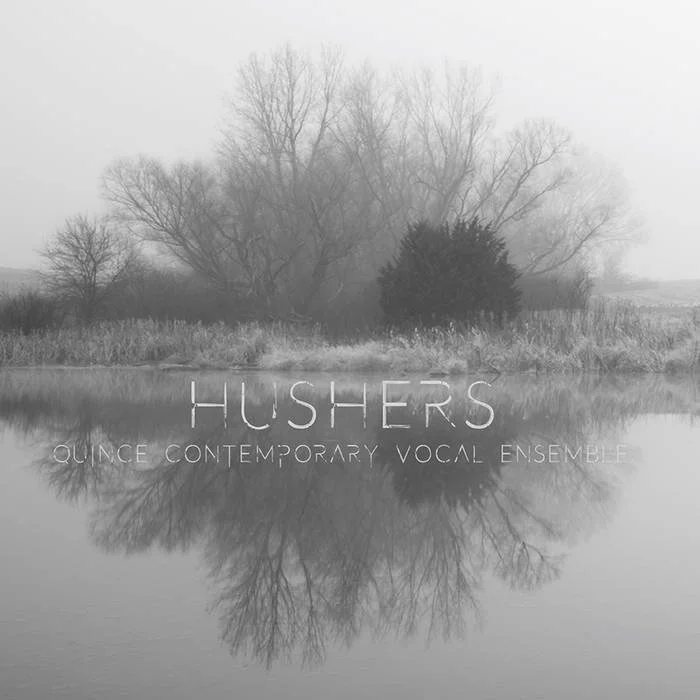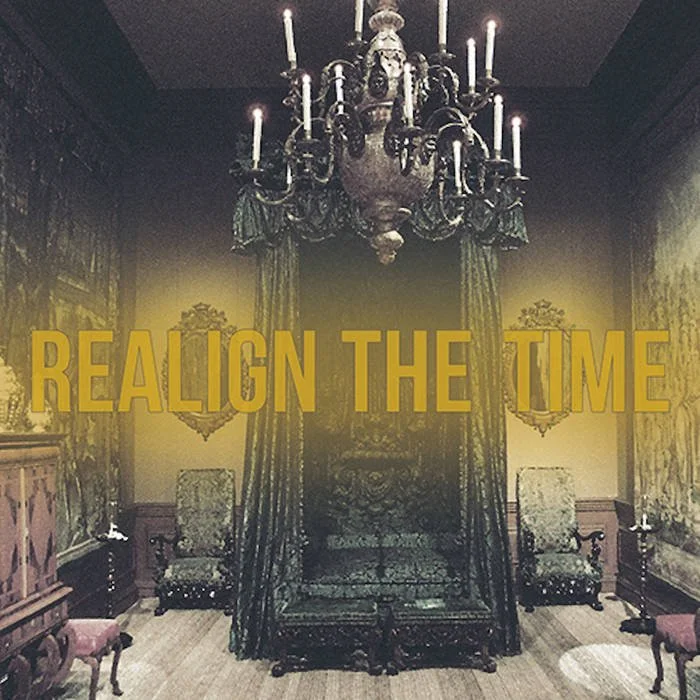OUT NOW: DUST BOWL
Our 6th studio album, DUST BOWL, released on July 11, 2025.
Recorded at Wild Sound Recording in St. Paul, Minnesota with Steve Kaul, this album represents nearly 10 years spent dreaming, commissioning, performing, and recording. It is our most personal project yet, weaving stories of our own family history into narratives surrounding the American Dust Bowl of the 1930s, climate change, migration, family separation, folk ballads, the music of Woody Guthrie, and more.
Featured composers include Michael Miller, Evan Williams, Eliza Brown, Annika Socolofsky, Liz Gre, Woody Guthrie, Lee Hayes, Elizabeth Pearse, Carrie Henneman Shaw, and Amanda DeBoer Bartlett.
Pre-order on Bandcamp!
PAST STUDIO ALBUMS
Madrigales del Río
Program note from composer Tomás Gueglio:
It was part of my family mythology that in her youth, my grandmother on my mother’s side had been featured as background talent (an ‘extra’) in a Argentine melodrama featuring Libertad Lamarque. At that time (the forties) Lamarque was well on her way towards becoming one the most sought after performers of the Spanish-speaking world. The name of the film is Cita En La Frontera (‘Meeting/Encounter At The Border’) and tells the story of a casino performer that dreams of a husband and vice-free more conventional home life.
Intoxicated by the glamor of a movie set, my grandma supposedly entertained the possibility of pursuing a career in acting and, not happy with her real name, adopted the pseudonym Libertad Del Río. Unfortunately, due to familial disapproval, her acting career started and ended with Cita En La Frontera and she could never put her lovely stage name to use. Lamarque left her mark though: a few years ago I found the movie on Youtube (it has since been taken down) and while watching it I was struck by the extent to which Lamarque’s performing style seemed to have shaped both of my grandmothers’ body language, mannerisms, and singing voices.
The text in Madrigales Del Río is sourced from the musical numbers in the movie. These numbers are mostly tangos that deal with issues such as love, longing, displacement, and (occasionally) redemption. By splicing and rearranging their lyrics through a collage-type technique, I sought to create a ruminating texture where the central themes of these tangos (love, longing, displacement, and redemption) flicker and fade decorating a progressively ascending melody.
------
Tomás Gueglio (IG handle @tomas.i.g.s) is a composer and guitarist from Argentina currently based in Chicago. His music mixes a variety of styles, usually resulting in surreal and kaleidoscopic textures. Elements central to his recent work are private languages, dreamscapes, and, as of late, melodramas and radio soap operas. For more info and samples of his work, please visit www.tomasgueglio.com
Released July 12, 2024
Composer: Tomás Gueglio
Soprano: Amanda DeBoer Bartlett
Soprano: Carrie Henneman Shaw
Soprano: Liz Pearse
Mezzosoprano: Kayleigh Butcher
Engineer: Steve Kaul
Mixing/Mastering: Steve Kaul
Cover artwork: Amanda DeBoer Bartlett
(c) all rights reserved
love fail
love fail (2012) is a 50-60-minute meditation created by Pulitzer-Prize-winning post-minimalist Americancomposer David Lang about the timelessness of love that weaves together details from medieval retellings of the story of Tristan and Isolde with stories from more modern sources. The music and libretto pull together narratives of love from such sources as Lydia Davis, Marie de France, Gottfried von Strassburg, Béroul, Thomas of Britain and Richard Wagner. The text is by David Lang (after Lydia Davis, Marie de France, Gottfried von Strassburg, Béroul, Thomas of Britain and Richard Wagner).
Why is it that people still like the story of Tristan und Isolde? “The greatest love story ever!” But why? Of course, there is excitement, drama, love, lust, shame, death, dragons. I think the real reason why is because the love of Tristan und Isolde begins by accident - they drink a love potion. It is almost a laboratory experiment into what love might be like without any of the complications of how real love begins or works - without the excitement, embarrassment, frustration, guilt, or competition present in the courtships of ordinary people.
So writes David Lang on why he wove together love fail (2012), into a tapestry of many versions of the 800-year old story. His libretto (with some help from Google Translate) draws from sources... more
Released April 24, 2020
Performed by Quince Ensemble
Amanda DeBoer Bartlett, soprano, glockenspiel
Kayleigh Butcher, mezzo soprano, conch shell, concert bass drum
Liz Pearse, soprano, ratchet, woodblock
Carrie Henneman Shaw, soprano, sizzle cymbal
Recorded at Wild Sound Studio, Minneapolis, MN, June/July 2019
Sound Engineering, Editing, Mixing, Mastering: Steve Kaul
Album Producer: Fredrick Gifford
Innova Director: Philip Blackburn
Operations Director: Chris Campbell
Publicist: Tim Igel
Innova is supported by an endowment from the McKnight Foundation.
www.innova.mu
Artwork by Carrie Henneman Shaw
Design by Amanda DeBoer Bartlett
(c) all rights reserved
Motherland
“To Quince, "Motherland" means our natal home, worthy of love, critique, and support. It represents the terrain of those who identify as women, as mothers of varying types - creators and producers and life-givers and life-sacrificers. Mother-land is both embodiment and inversion of Emily Dickinson’s “Nature, the gentlest mother” - capable of supporting all life, and of obliterating it with forces as simple as a breath of air. This album features never-before-heard recordings of pieces by Laura Steenberge, Gilda Lyons, Cara Haxo, and Jennifer Jolley. As long as we have breath left in us, we will sing our gratitude, our love, our frustration, and our hopes. There is no greater privilege.” — from the liner notes by Quince Ensemble
With this bold statement, Quince Ensemble presents its ambitious, socially engaged second album with New Focus, "Motherland". Featuring premiere recordings of works by Gilda Lyons, Laura Steenberge, Cara Haxo, and Jennifer Jolley, Motherland’s range is as wide in terms of subject matter as it is in terms of sonic palette. Gilda Lyons wrote Bone Needles after being inspired by the work of women in Nicaragua who were repairing nets on the beach. The women used long needles made with fish bones-- Lyons explores the ways in which musical elements similarly weave and mend together, using a vocabulary of abstract vocal sounds. Laura Steenberge’s The Four Winds explores the mystique of the North Star, and its significance in an imagined ancient past before we had other tools to track our way. Cara Haxo’s Three Erasures are based on ingenious poetry by Emily Corwin that “erases” words from Teen Vogue magazine articles, exposing the mass media’s complicated and fraught relationship with women’s appearance and bodies. When she wrote Prisoner of Conscience Jennifer Jolley could not have imagined the deep added relevance her work would take on in post 2016 election America. Jolley chose to write a work about the arrest and trial of the Russian female punk group Pussy Riot by Putin’s regime for their outspoken criticism of his government. As Pussy Riot has remained engaged and critical of government abuses in Russia and the West and now that Russian meddling in the U.S. election and connections with the White House are front page news, Jolley’s subject matter and strong stance supporting the Russian band seems prescient. In our current climate of insecurity and doubt about the political future of the world, it is heartening to see young artists stand up and make work that proclaims their convictions with authority and commitment. Quince Ensemble is such a group, and this album, while years in the making, is extremely timely both in its engagement with women’s issues and civil liberties that are foremost on many minds in 2018.
Released April 6, 2018
Engineered by Dan Nichols, Aphorism Studios
Quince Ensemble; Amanda DeBoer Bartlett; Liz Pearse, Carrie Henneman Shaw, Kayleigh Butcher
Artwork and layout by Amanda DeBoer Bartlett
Hushers
The opening bars of Warren Enström’s Hushers on Quince Contemporary Vocal Ensemble’s new release emphasize extended fricative sounds that could be mistaken for a percussion ensemble. When we finally hear sung notes emerge, they are first accompanied by hisses and shushes, and the pitches themselves push up against each other in dissonant intervals. With extended techniques woven into the fabric of a timbre and sound driven texture, Hushers squarely inhabits a 21st century vocal aesthetic. Kate Soper’s Songs for Nobody returns to traditional text setting, setting work by American poet, Thomas Merton. Written as the result of a commission from the Museum of Biblical Art in New York, Soper endeavored to capture Merton’s faith in the purity of the inner life. Saariaho’s From the Grammar of Dreams sets excerpts from The Bell Jar by Sylvia Plath for two singers, embodying the instability of the protoganist’s struggles with issues of life and death, madness and solace. In the second movement, each singer in the duo alternates between athletic singing and forceful, rhythmic recitation of the text, creating an unsettling texture where song and speech are unbroken even as each individual performer leaps back and forth between roles. This alternation culminates in the earthy fourth movement, as the twosingers hocket between each other in spats of heavy breathing and swooping, plaintive figures. Giacinto Scelsi’s compositional process was unique — he considered himself a “receiver” of sounds, and recorded improvisations to hand off to a colleague to notate and orchestrate. On Sauh I-IV, Scelsi uses phenomes instead of language setting, lending the piece a ritualistic, chanting quality (fitting given Scelsi’s fascination with Hindu and Buddhist ritual). The relationship between Sauh I-II and Sauh III-IV is close — the first two duos provide the seed material for the fleshed out quartet versions. After a journey through the intensity of the Plath and Merton text settings, the disc closes in a world of abstract syllables and non-semantic meaning, as it began.
Released February 3, 2017
Producers: Brian Penkrot (track 1), Brian Penkrot, Carrie Henneman Shaw, Eric Fernandez (tracks 2-4), Amanda DeBoer Bartlett (tracks 5-9), Eric Fernandez, Brian Penkrot (tracks 10-13)
Recording Engineer: Dan Nichols Edited, Mixed and Mastered at Aphorism Studios
''Song'' By Thomas Merton, from THE COLLECTED POEMS OF THOMAS MERTON, copyright ©1949 by Our Lady of Gethsemani Monastery. Reprinted by permission of New Directions Publishing Corp.
''Love Winter When the Plant Says Nothing'' By Thomas Merton, from THE COLLECTED POEMS OF THOMAS MERTON, copyright ©1963 by The Abbey of Gethsemani. Reprinted by permission of New Directions Publishing Corp.
''Song for Nobody'' By Thomas Merton, original by Cesar Vallejo, from THE COLLECTED POEMS OF THOMAS MERTON, copyright
©1963 by The Abbey of Gesthemani, Inc. Reprinted by permission of New Directions Publishing Corp.
Realign the Time
Realign the Time features 50 minutes of music written specifically for Quince Ensemble by composers - Amanda Feery, Anthony T. Marasco, David Grant, Max Grafe, Morgan Krauss, Ravi Kittappa, and Jonathan Sokol.
In 2014, Quince Ensemble was comprised of vocalists Aubrey von Almen, Amanda DeBoer Bartlett, Kayleigh Butcher, and Liz Pearse.
This album would not have been possible without the generous funding of the Aaron Copland Fund for Music and the kind-hearted contributions of our Indiegogo donors.
Released May 15, 2014
Audio Engineer: Bruce Bartlett
Performed by: Quince Ensemble
Recorded in Asheville, NC





